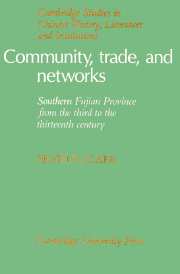Book contents
- Frontmatter
- Contents
- List of maps and tables
- Acknowledgments
- 1 Problems and approaches
- 2 The late Tang
- 3 The interregnum: politics, structure, and administration
- 4 The interregnum: society and economics
- 5 The Song: demography and networks
- 6 The Song: trade and economy
- 7 Conclusions
- Appendix 1 Townships (xiang), villages (li), and command brigades (dubao) under the Song
- Appendix 2 A discussion of population distribution
- Appendix 3 Pre-Song and Song bridges by district in twenty-five-year intervals
- Appendix 4 Place names in the Yunlu manchao and Zhufan zhi
- Appendix 5 Abbreviations
- Notes
- Glossary
- Bibliography
- Index
6 - The Song: trade and economy
Published online by Cambridge University Press: 13 October 2009
- Frontmatter
- Contents
- List of maps and tables
- Acknowledgments
- 1 Problems and approaches
- 2 The late Tang
- 3 The interregnum: politics, structure, and administration
- 4 The interregnum: society and economics
- 5 The Song: demography and networks
- 6 The Song: trade and economy
- 7 Conclusions
- Appendix 1 Townships (xiang), villages (li), and command brigades (dubao) under the Song
- Appendix 2 A discussion of population distribution
- Appendix 3 Pre-Song and Song bridges by district in twenty-five-year intervals
- Appendix 4 Place names in the Yunlu manchao and Zhufan zhi
- Appendix 5 Abbreviations
- Notes
- Glossary
- Bibliography
- Index
Summary
Having examined the context in which the economy of Quannan was transformed during the eleventh and twelfth centuries, I turn finally to that economy itself. The Song was a period of unmatched economic expansion in many parts of the empire. This point has been examined extensively by such scholars as Kato Shigeshi, Shiba Yoshinobu, Sogabe Shizuo, Sudo Yoshiyuki, Kawakami Kōichi, Liang Gengyao, Song Xi (Sung Shee), Robert Hartwell, and too many others to list. From their work we know that there was an unprecedented commercial expansion that took place primarily in the lower Yangtze valley but that affected all parts of the empire to some extent. The goods involved in this commerce included the finished products of the empire's workshops and artisans, raw agricultural goods including both regional specialties such as fruits and bulk items such as rice, and the imported goods of the South Seas trade. Some products, particularly regional specialties and imported luxuries, were traded across the empire as merchants forged networks linking all the major regions and population centers; others moved within more limited trading spheres.
In the following chapter I shall seek to demonstrate that the merchants of Quannan maintained those trading networks forged by their Tang and interregnum predecessors and forged new ones for the distribution of the ever-growing volume of imported goods arriving in their ports; to an unprecedented degree these networks tied Quannan to the major markets of the empire. In the process the transshipment trade in imports led to a fundamental transformation of the productive patterns of Quannan.
- Type
- Chapter
- Information
- Community, Trade, and NetworksSouthern Fujian Province from the Third to the Thirteenth Century, pp. 120 - 167Publisher: Cambridge University PressPrint publication year: 1991

